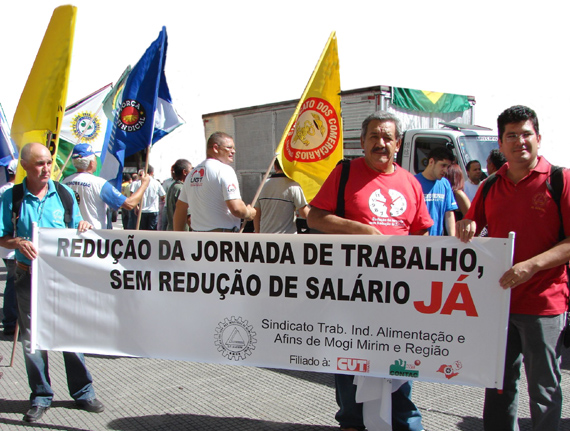|
Yesterday, Monday 11th, in Sao
Paulo, the United Workers’ Federation (CUT),
together with the other Brazilian trade
union federations, held the first public act
to promote the Joint Campaign to Reduce the
Workday without Reducing Wages and launched
the drive to collect signatures. Sirel spoke
with Siderlei de Olivera, president of
Brazil’s National Confederation of Food
Workers (CONTAC) and CUT’s National
Institute of Health, Labor and Environmental
Matters (INST).
-What can you tell us about yesterday’s
activity in Sao Paulo, held to launch the
Campaign to Reduce the Workday?
-Brazil’s eight labor federations were
there, and that’s a very good thing. The
goal of this Campaign is to obtain a million
signatures to support a bill reducing the
workday, and to submit it to Congress
through the mechanism of “popular
initiative.” CONTAC has been working
for a long time on this and has gone to
Congress to distribute a specific bill for
our industry, which even includes six hour
shifts for the poultry sector, a greater
reduction than what CUT proposes,
because these workers perform unhealthy
tasks.
But we agree with the demand for all
industries in general, which is the proposal
to lower the workweek to 40 hours, and which
will no doubt generate new jobs. In the case
of the food industry, we have full
employment because there have been no recent
layoffs. On the contrary, many companies are
increasing their workforces, in particular
meatpacking plants.
For us, a reduction in the workday is also
important because it would reduce
occupational diseases and work-related
accidents. It’s obvious that if we reduce
the number of hours in which workers are
exposed to unhealthy working conditions, to
the cold, to intense paces of production,
their health will suffer less. Improving and
protecting the quality of life of workers is
as important as generating new jobs.
-Which activities have a greater incidence
of occupational diseases?
-Metal works, food production, banking
services and construction works are the four
sectors that lead the statistics in this
sense. One of the main reasons for this is
the workload and the intensity of the
workdays. That is why reducing working hours
to 40 per week, controlling overtime and
eliminating the so called “hour banks” will
contribute to improve working conditions in
terms of health.
-Besides the simple arithmetic result of
distributing the number of work hours among
more people, in what other ways will a
shorter workday create new jobs?
-That’s very important, because often when
people talk about unemployment they only
refer to those workers who had a job and
lost it, but statistics rarely include the
millions of young people who enter the work
market and can’t find their first job.
Brazil currently has a stable economy,
maybe even one of the most stable economies
in the world, so much so that there are no
signs of it being affected by the huge
crisis underway in the United States.
But what we want is for those benefits, for
that economic consolidation, to reach
workers as well, generating more quality
jobs for these young people. Only then will
we be able to say that we live in a
“Brazil for everyone.”
-How are employers and the political
establishment reacting to this proposal?
-Naturally, management will initially reject
our demand; they are going to be against it.
But as this is a “popular initiative,” that
is, a bill that is presented directly to
Congress by organized citizens, backed by a
stipulated number of signatures, it will be
difficult for legislators to vote against a
demand that comes from their own
constituencies, the same people they will
have to appeal to in the next elections if
they want to be reelected.
By law, only a million signatures are
required, but we’re aiming for 20 million,
in order to give the project the greatest
support possible so that it will not be
rejected by Congress.
-How long do you think it will take to
collect that many signatures?
-We think two or three months. If all the
categories participate and everyone does
what they have to do, it’s a perfectly
reasonable timeframe. In the food sector we
expect to collect some 800,000 signatures.
We are going to fight to achieve it. We
mustn’t forget that all the labor
federations are participating in this
movement, so I predict that if we all do
what we have to do, we’ll not only reach
that number, we’ll beat it.
 |